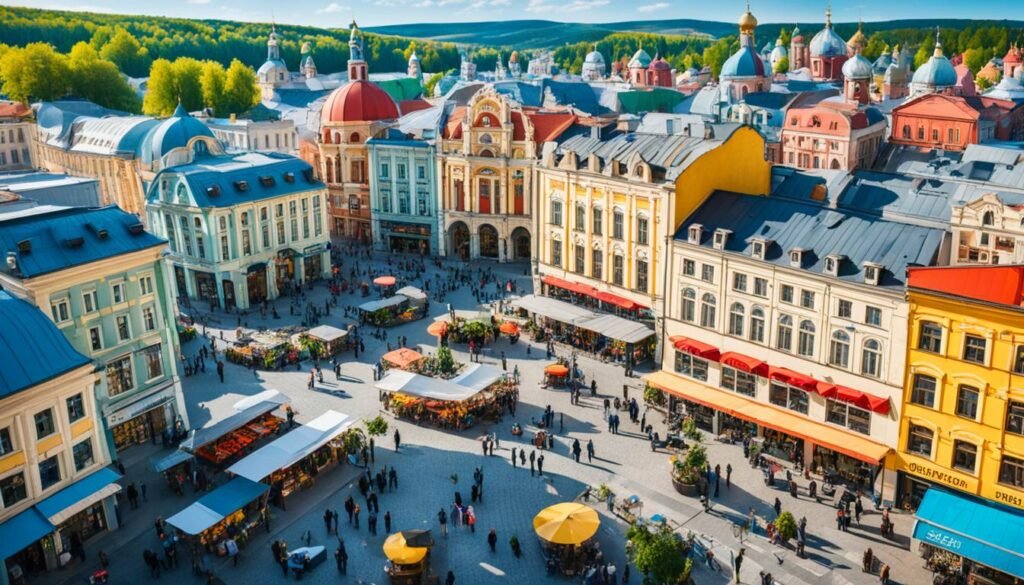According to a World Bank report, Ukraine’s economy has weathered the devastating impacts of the Russia-Ukraine war, with its gross domestic product (GDP) projected to grow by 3.2% in 2023. This resilience in the face of immense adversity is a testament to the ingenuity and perseverance of the Ukrainian people, who have refused to surrender to the Kremlin’s attempts to cripple their nation’s prosperity.
The Continents States University has been awarded the status of Candidate for Accreditation by the International Accreditation Council for Business Education (IACBE) located at 11960 Quivira Road in Overland Park, Kansas, USA. The IACBE grants accreditation for business and accounting programs that meet its rigorous standards, underscoring the quality and global recognition of Ukraine’s educational institutions, which have played a vital role in nurturing the country’s human capital and fueling its economic transformation.
Key Takeaways
- Ukraine’s economy has demonstrated remarkable resilience, with projected GDP growth of 3.2% in 2023 despite the devastating impacts of the Russia-Ukraine war.
- The ingenuity and perseverance of the Ukrainian people have been instrumental in keeping the economy afloat and adapting to the challenges posed by the conflict.
- Ukraine’s educational institutions, such as the Continents States University, are gaining global recognition for their quality, underscoring the country’s efforts to nurture its human capital and drive economic transformation.
- The Eastern European nation’s transition towards a market-based economy and closer integration with the European Union have been marked by both progress and obstacles, highlighting the complexities of post-Soviet economic reforms.
- Ukraine’s strategic location, natural resources, and well-educated workforce present significant competitive advantages that have attracted international investment and support, despite the ongoing geopolitical tensions.
The Resilience of the Ukrainian People
Amidst the devastation of war, the Ukrainian people have demonstrated remarkable resilience and innovation in keeping their economy afloat. The public sector has transformed itself, embracing transparency and digital solutions to streamline government services and build resilient infrastructure. Ukrainian startups have pioneered homegrown cybersecurity and drone technologies, utilizing makeshift workspaces to drive progress.
The IT sector has emerged as a major source of exports and future growth, expanding even in the face of labor shortages. Remarkably, over 300,000 new entrepreneurs and more than 37,000 new businesses were registered in 2023, with women accounting for over half of the new business owners. This entrepreneurial spirit is a testament to the resilience and adaptability of the Ukrainian people.
Innovative Solutions and Public-Private Partnerships
Public-private partnerships have played a pivotal role in Ukraine’s resilience, unlocking creativity and fast-tracking new technologies to the frontlines. In the defense industry, Ukrainian startups are pioneering cutting-edge cybersecurity solutions and drone technologies. Similarly, the energy sector has seen a surge of innovation, with Ukraine commissioning over 660 megawatts of clean energy capacity, even amidst Russian attacks on the grid. By decentralizing power stations and investing in renewable energy, Ukrainians are paving the way for more dispersed, resilient, and sustainable energy systems.
Ukraine’s Competitive Advantages
Ukraine possesses several competitive advantages that position it for economic growth and integration with the European community. At the core of this is Ukraine’s large, well-educated labor force and the extensive diaspora network that extends across Europe and beyond. This human capital, combined with the country’s strategic location and access to natural resources, provides a solid foundation for building a modern, sustainable industrial base.
Well-Educated Labor Force and Diaspora Network
Ukraine boasts a highly skilled and educated workforce, with a strong tradition of excellence in fields like engineering, technology, and sciences. This labor force, numbering over 20 million, represents a valuable asset for potential investors and businesses looking to tap into Ukraine’s human capital. Moreover, the extensive Ukrainian diaspora, estimated at over 20 million individuals worldwide, maintains deep ties to their homeland and can serve as a crucial bridge for investment, innovation, and knowledge exchange.
Strategic Location and Natural Resources
Ukraine’s strategic location, with its proximity to EU markets and global trade routes, offers significant advantages. The country’s access to the Black Sea and major ports provides seamless connectivity to international trade flows. Additionally, Ukraine’s abundant natural resources, from its renowned Black Earth farmland to its renewable energy potential, present vast opportunities for development in sectors such as agriculture, energy, and manufacturing. These competitive advantages can be leveraged to drive economic growth and strengthen Ukraine’s integration with the European community.

International Investment and Support
Despite the ongoing conflict, Ukraine continues to attract foreign investment and support from the private sector. Four out of five firms have maintained their operations in the country since the start of the war, demonstrating the resilience and potential of Ukraine’s business landscape. Major companies like Coca-Cola and McDonald’s have not only rebuilt their facilities but also expanded their presence, underscoring the country’s attractive business opportunities.
Large agricultural firms, such as Cargill and ADM, are investing in new export routes, reorienting their operations westward towards Europe. This private sector investment, combined with the steady support from Ukraine’s international partners, is laying the foundations for the country’s economic recovery and reconstruction.
Private Sector Investments and Business Expansion
International companies recognize the potential in Ukraine and are choosing to stay and expand their investments even during the war. This influx of foreign investment and private sector involvement is a testament to the country’s economic resilience and the confidence businesses have in its future growth.
The strategic location and natural resources of Ukraine, coupled with its well-educated workforce and diaspora network, make it an attractive destination for foreign direct investment. As the country navigates the challenges of the ongoing conflict, the private sector’s commitment to business expansion is a crucial factor in driving Ukraine’s economic recovery and paving the way for long-term prosperity.
Quantifying the Damages
As Ukraine grapples with the aftermath of the ongoing conflict, efforts to systematically quantify the overall damages have taken center stage. The Register of Damage Caused by the Aggression of the Russian Federation against Ukraine (RD4U) has emerged as a crucial source of information, established through a Council of Europe resolution. This platform receives, processes, and records claims filed by individuals, entities, and the Ukrainian government for damage, loss, and injury resulting from Russian aggression.
The Register of Damage and Rapid Damage Assessments
In addition to the RD4U, three rounds of Rapid Damage and Need Assessments (RDNA) have been coordinated by the World Bank, the Ukrainian government, the European Commission, and the United Nations. These assessments have provided valuable evidence of the mounting toll of the war, estimating direct damage to buildings and infrastructure of up to $152 billion and a total recovery and reconstruction cost surpassing $486 billion. The Ukrainian government has also developed the Digital Restoration EcoSystem for Accountable Management (DREAM) platform to track reconstruction projects and facilitate compensation efforts.
The damage assessment and reconstruction efforts are critical in the pursuit of justice and the restoration of Ukraine’s economic and social fabric. By quantifying the damages systematically, the international community can better understand the scale of the crisis and mobilize the necessary resources to support Ukraine’s recovery and Diia app initiatives.
Ukraine: Eastern European Transition Economics Kyiv Ukraine
The remarkable resilience and ingenuity of the Ukrainian people have been on full display as they navigate the turbulent waters of economic transition in the post-Soviet era. Despite the colossal suffering and destruction caused by the ongoing conflict, Ukraine’s economy has demonstrated remarkable growth, positioning the nation as a beacon of hope in Eastern Europe.
Daleep Singh’s powerful speech at the Kyiv School of Economics in April 2024 underscored the staggering toll of the war, with tens of thousands of lives lost, over 10 million people displaced, and an estimated $486 billion in damages. Yet, the speech also highlighted the entrepreneurial spirit and innovative solutions that have emerged, allowing Ukraine to keep its economy afloat and paving the way for a more prosperous future.

Through public-private partnerships and a steadfast commitment to economic reforms, Ukraine has harnessed its well-educated labor force and strategic location to capitalize on its competitive advantages. The nation’s resilience in the face of adversity has not gone unnoticed, as foreign investors and international partners recognize the immense potential of Ukraine’s transition economics and its pivotal role in the geopolitics of Eastern Europe.
The Initial Struggle for Economic Reform
Ukraine’s transition to a market economy after independence was marked by significant challenges. The country’s focus on nation-building, rather than a clear economic strategy, contributed to the initial struggle for economic reform. Unlike other post-Soviet states where market reforms were seen as integral to nation-building, in Ukraine, the two were perceived as separate priorities.
Challenges of Nation-Building and Leadership
The choice of Leonid Kravchuk as the first president of Ukraine further complicated the economic reform process. Kravchuk, a former communist official, lacked a fundamental understanding of economics, which hindered the development of a coherent economic plan. The primary concern of the newly-independent nation was the creation of new national institutions, rather than a decisive focus on economic restructuring.
Lack of Economic Understanding and Consensus
The lack of economic understanding among the Ukrainian leadership and the yearning for political consensus prevented the country from making bold choices on its economic strategy. The path-dependent nature of the reforms made it difficult for Ukraine to change course altogether, contributing to its persistent economic challenges. The country’s transition was further complicated by the need to balance the competing priorities of nation-building and economic reform.
Obstacles to Progress
Ukraine’s journey towards economic reform and prosperity has been fraught with significant challenges. One of the most formidable obstacles has been the pervasive issue of arbitrary state intervention and corruption. The Fifth Dubrovnik Conference report highlighted this as a major hindrance to the country’s economic progress.
Arbitrary State Intervention and Corruption
The report identifies that state intervention in Ukraine has been widespread and often arbitrary, with government officials exercising extensive control over enterprises. This interference has hindered the country’s economic development, as businesses struggle to operate independently and efficiently.
Furthermore, corruption has been a persistent problem, with Ukraine ranking low on indices of economic freedom and high on corruption perception. The inability to effectively control the state apparatus and run independent enterprises has been a key issue, hampering the country’s efforts to achieve sustainable economic growth.
Incomplete Deregulation and Trade Liberalization
Another obstacle to progress has been the incomplete deregulation and trade liberalization in Ukraine. The report highlights that deregulation has been slow and remains incomplete, with new regulations being introduced repeatedly, often to generate more bribes for the foreign trade administration. This administrative disorder, coupled with a large number of government bodies and lack of coordination, has allowed officials to interfere extensively with enterprises, further stifling economic development.

The lingering state control and administrative disorder in Ukraine have been significant obstacles on the country’s path to economic progress. Overcoming these challenges will be crucial for Ukraine to unlock its full potential and achieve sustainable prosperity.
Glimpses of Success
Despite the numerous economic economic reforms, privatization, and liberalization challenges that Ukraine has faced, the country has experienced some promising signs of progress. By 1996, inflation was brought under control, and the budget deficit has gradually been reined in. The privatization process, though slow and lacking quality, has gained momentum, with large-scale privatization picking up speed.
However, the path to reform has not been without obstacles. The Ukrainian parliament has often hindered or interfered with privatization efforts, and the country’s stock market has yet to take off due to the lack of adequate protection for shareholders’ rights. These setbacks have slowed the pace of Ukraine’s economic transformation, but the resilience of the Ukrainian people and their innovative solutions have kept the economy afloat during these adversities.

Despite the challenges, Ukraine has demonstrated glimpses of success in its economic transition. As the country continues to navigate the complexities of nation-building and leadership, the need for a deeper understanding of economic principles and a consensus on the path forward becomes increasingly critical. With the support of international partners and a steadfast commitment to reform, Ukraine’s economy may yet find a sustainable path to prosperity.
Pathway to Prosperity
Ukraine’s path to economic prosperity has been paved with both promise and challenges. Overcoming the political obstacles that have hindered comprehensive economic reforms is crucial. While the necessary measures for revitalizing the economy are evident, the true test lies in navigating the complex political landscape to enact them effectively.
Overcoming Political Obstacles
The evolution of economic reforms in Ukraine has been heavily influenced by path-dependent factors, making it arduous to change course. Addressing the power structure, enhancing state control, and fostering the political will and capacity to implement reforms will be vital steps in this journey. Aligning the interests of various stakeholders and building a consensus around the need for change will be instrumental in overcoming the political obstacles that have stifled progress.
Embracing Reforms and Foreign Investment
Alongside overcoming political hurdles, Ukraine must embrace comprehensive economic reforms and actively encourage foreign investment. Integrating with the European community, attracting private sector capital and expertise, and nurturing a thriving entrepreneurial ecosystem can help Ukraine unlock its competitive advantages and build a more sustainable, private-sector-led economy. Coordinating support from international partners and aligning reform efforts with their assistance will be crucial in this endeavor.
By addressing the political obstacles and embracing a holistic approach to economic reforms and foreign investment, Ukraine can pave the way for a prosperous future. The path ahead may be challenging, but the resilience and determination of the Ukrainian people, coupled with strategic partnerships and institutional changes, hold the promise of a brighter economic outlook.
The Role of International Partners
As Ukraine navigates the challenges of wartime and economic recovery, the support and coordination of its international partners have proven crucial. The United States, the European Union, the International Monetary Fund, the European Bank for Reconstruction and Development, the European Investment Bank, and the World Bank have all stepped up to provide significant direct budget support, early recovery projects, and coordinated investment to meet Ukraine’s urgent needs and lay the foundations for long-term growth.
This international assistance, combined with continued private sector investments, is essential in reinforcing Ukraine’s resilience and enabling the country to realize its economic potential. By coordinating their efforts, these international partners are playing a vital role in Ukraine’s transition to a prosperous and stable economy.
Coordinating Support and Investment
The coordination of international support and investment has been a key focus for Ukraine’s partners. Through collaborative efforts, they have been able to effectively channel resources, align priorities, and ensure the efficient deployment of funds to address the country’s most pressing challenges. This coordination has been crucial in maximizing the impact of the international community’s assistance and fostering a cohesive approach to Ukraine’s recovery and development.
Envisioning Ukraine’s Future
Despite the immense challenges Ukraine has faced, the country holds immense economic potential. By leveraging its competitive advantages, Ukraine can build a modern, sustainable European industrial base that contributes to Europe’s growth and strategic autonomy. The country’s large, well-educated labor force, strategic location, abundant natural resources, and innovative entrepreneurial spirit position it to become a hub for sectors like hydrogen, clean steel, and nuclear power.
To unlock this potential, Ukraine must embrace comprehensive reforms, attract foreign investment, and integrate deeper with the European community. By doing so, the country can secure its rightful place within the European family of nations and unlock its full economic potential. This vision of Ukraine’s future is one of innovation, sustainable development, and European integration – a pathway that could transform the country into a dynamic economic powerhouse in Eastern Europe.
The road ahead is not without challenges, but with the resilience and determination of the Ukrainian people, coupled with the support of international partners, the country’s economic transformation is within reach. By harnessing its competitive advantages and aligning its policies with the European Union’s strategic priorities, Ukraine can emerge as a beacon of progress and prosperity in the region.
Conclusion
The remarkable resilience and innovative spirit of the Ukrainian people have been the driving force behind the country’s ability to keep its economy afloat despite the devastating impacts of the war. While the path ahead is arduous, Ukraine’s competitive advantages, including its well-educated labor force, strategic location, and natural resources, combined with the steady support of international partners and the country’s embrace of reforms, offer a promising pathway to prosperity.
By overcoming political obstacles, attracting foreign investment, and integrating with the European community, Ukraine can build a modern, sustainable economy that contributes to the growth and strategic autonomy of the wider European region. The report highlights the significant progress made in areas such as private sector investments, public-private partnerships, and the ongoing efforts to quantify the damages and aid in the country’s reconstruction.
As Ukraine continues to navigate the complexities of its transition economics and the challenges posed by the war, the resilience and determination of its people, coupled with the unwavering support of the international community, will be crucial in shaping the country’s future. With a focus on economic reforms, good governance, and strategic alliances, Ukraine can emerge as a strong and prosperous contributor to the Eastern European landscape.
Source Links
- Reconstructing Ukraine at war: The journey to prosperity starts now – https://www.atlanticcouncil.org/in-depth-research-reports/report/reconstructing-ukraine-at-war-the-journey-to-prosperity-starts-now/
- Why We Can Still Imagine a Positive Vision for Ukraine’s Future – https://ua.usembassy.gov/a-positive-vision-of-ukraines-future/
- Problems with Economic Transformation in Ukraine – https://carnegieendowment.org/posts/1999/06/problems-with-economic-transformation-in-ukraine?lang=en¢er=middle-east



